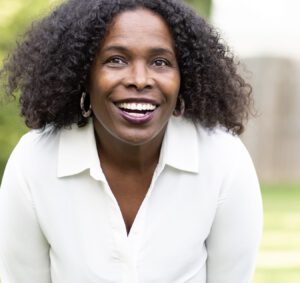Meet Melinda King, 23andMe’s new Director of Diversity, Equity, and Inclusion (DEI) and People Business Partner.
Melinda previously served as an Assistant Vice President at the University of Alabama, her alma mater. Her responsibilities included leading the University’s career center and heading up Diversity, Equity, and Inclusion for the University’s Division of Student Life. She has more than two decades of human resources experience, working with companies in Texas, Pennsylvania, Minnesota, and Florida. 
Melinda’s decision to come out west and work with 23andMe had a lot to do with last year’s events and a letter written by our founder and CEO Anne Wojcicki. The letter came in the wake of the Black Lives Matter demonstrations sparked by the killing of George Floyd. In it, Anne acknowledged 23andMe’s own failings, and she pledged that 23andMe would make its hiring practices and its products more inclusive.
For Melinda, it was a refreshingly candid response, and she reached out to Anne directly on LinkedIn. In the months since then, 23andMe has started to make progress. (More on that to come next month.) Melinda is going to help us continue our DEI work. As she says, this kind of effort isn’t a one-off project that you do and then move on. It’s a long-term commitment to change company culture.
We sat down with Melinda to chat about her, her role at 23andMe, and what she hopes to achieve. As we look back at 2020, we can see some silver linings. The problematic year pushed important issues to the forefront that needed to be addressed, including improving diversity, equity, and inclusion in hiring, our employees’ experience, our product, our health research, and our community impact.
What drew you to 23andMe?
“The opportunity to combine my passion for DEI with the ability to work for an organization that is improving health care outcomes, especially for those in marginalized communities. Really excited to be a part of work that has a broader impact.”
Could you add more details about reading Anne’s letter regarding the Black Lives Matter movement and how it affected your decision to come here?
“After the George Floyd murder, I decided I needed to be more solution-driven in the current movement regarding the impact of systemic racism and how it has manifested itself around police brutality for black and brown bodies. I had grown skeptical regarding the number of organizations that were making bold public statements around their commitment to Diversity. When I saw Anne’s willingness to call her own company out, I found it refreshing that she was willing to say her organization was part of the problem. I felt this is an organization that I want to connect with to see how I can assist them with their DEI journey. ”
As the Director of DEI, what do you hope people outside the company take away from your hire? What about those inside the company?
“DEI work is not a one-person job, but it is important to have someone to ensure the work that is done is strategic and sustainable. My hope is individuals within and outside the company will view this role as a long-term commitment to having a diverse workforce, with equitable opportunities and an inclusive culture.”
Can you talk about 2020 and whether you think that it marked an inflection point for companies looking more seriously at DEI in the workplace?
“Absolutely, 2020 brought the issues of systemic racism into everyone’s living room. It was further complicated by COVID. You really could not escape what was happening around the country and the impact it was having on the workforce. Organizations that normally would stay away from conversations about social justice had no choice but to address it because people could not separate what was happening to others from their own lives. For a lot of leaders, it was the first time they really understood the impact inequalities have on people they work with and care about. They realized they could no longer stand on the sidelines.”
Do you see a nexus between DEI in the workplace and what 23andMe is trying to do to improve diversity in its research?
“I do. We all know there is a gap between the disparities in health care outcomes for minorities and other marginalized communities. Research is one of the vehicles to close that gap. It will be important for 23andMe to engage with those communities to better understand those medical conditions and to offer solutions for those most impacted.”
What are some things you can share about the coming year and what you hope to focus on?
“I really just want to continue the trend of turning words into action around this important work. To make certain we look at all of our major decisions through a DEI lens.”




